|
Additional Lessons |
 About These
Lessons About These
Lessons
The following classroom lessons are great for students
who want additional listening and reading practice. |
-
Travel America -
Beginner
Level. Do you love America and American
English? Learn before you travel. Facts and other
cool stuff about your favorite U.S. state. Great
English reading practice.
|
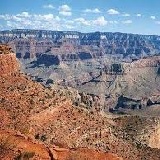 Travel
America - Arkansas Travel
America - Arkansas
(Beginner -
Reading)
Learn some interesting facts and read interesting
stories about Arkansas. |
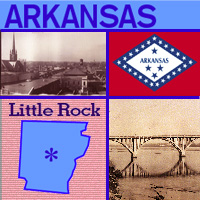 Arkansas Arkansas
Arkansas, which joined the Union in 1836, was the
25th state. The early French explorers of the state
gave it its name, which is probably a phonetic
spelling for the French word for "downriver" people,
a reference to the Quapaw Indians and the river
along which they settled. Arkansas is the only state
in which diamonds have been mined, although today
the mine operates only as a tourist attraction. The
state flower is the apple blossom. The current state
nickname is the Natural State but in the past it was
also known as the Land of Opportunity and the Wonder
State. |
 Arkansas
State Flag Arkansas
State Flag
The state flag of Arkansas is red, white, and blue
to signify that Arkansas is one of the United States. The
large diamond represents the only diamond producing state in
the USA - Arkansas. 25 white stars show Arkansas as the 25th
state to join the Union. Three blue stars below the word
ARKANSAS are symbols for the three nations which ruled
Arkansas before it became a state (Spain, France, and the
United States), and also signify that Arkansas was the third
state created out of the Louisiana Purchase. The fourth lone
star above the word ARKANSAS represents the Confederacy.
In 1912 the battleship Arkansas was to be commissioned, and
the Pine Bluff chapter of The Daughters of the American
Revolution (DAR) promised to present the ship with an
Arkansas state flag for the occasion. However, when they
wrote to the Secretary of State to learn more about the
flag, he replied that Arkansas had no State flag!
The DAR went into action and held a contest in Arkansas for
a state flag design. Miss Willie Hocker from Wabbaseka, AR
submitted the winning entry (the Confederate star was not
part of this original design, but added later by
legislature).
Salute To The State Flag
"I Salute the Arkansas Flag With Its Diamond and Stars. We
Pledge Our Loyalty to Thee." |
|
Source:
State Symbols USA |
|
|
 Arkansas
State Facts Arkansas
State Facts
Picture: state seal of Arkansas |
|
State Capital |
Little Rock |
|
Nickname |
The Natural State / Land of Opportunity / Wonder
State |
|
Motto |
Regnat Populus (The people rule) |
|
Statehood |
June 15, 1836 (25th) |
|
Origin of Name |
French interpretation of a Sioux word "acansa,"
meaning "downstream place." |
|
Largest Cities |
Little Rock, Fort Smith, North Little Rock, Pine
Bluff, Jonesboro |
|
Border States |
Louisiana, Mississippi, Missouri, Oklahoma,
Tennessee, Texas |
|
Area |
52,075 sq. mi.; 27th largest |
|
State Bird |
Mockingbird |
|
State Flower |
Apple blossom |
|
State Tree |
Pine (pinus) |
|
State Song |
Arkansas Oh, Arkansas |
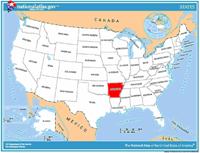 Travel and tourism site for Arkansas - This state travel and
territorial tourism site provides ideas for your vacations,
meetings, and more. Travel and tourism site for Arkansas - This state travel and
territorial tourism site provides ideas for your vacations,
meetings, and more. |
|
|
Arkansas Stories |
|
|
Mountains of Arkansas
The Ozark Mountains of Arkansas are the largest mountain range
between the Appalachian Mountains in the East and the Rocky
Mountains in the West.
The Ozark Mountains of Arkansas may have been named for Aux Arc, a
French trading post located there in the 1700s. In French, Aux Arc
means "at the bow." The limestone that is found there wears away
easily and is responsible for many unusual geographic features, such
as caves, sinkholes and underground streams. The Ozarks region is
also known for its folk crafts and outdoor recreation. |
|
|
Tribute to Louis Jordan
You might have heard of Louis Armstrong and Bing Crosby, two
well-known and popular musicians, but it's very possible that you've
never heard of Louis Jordan, who was just as popular when he was
alive.
Arkansas-born Louis Jordan (1908-1975) is considered the father of
rhythm & blues, rock 'n' roll, and even rap. During the 1940s and
1950s he was one of the few African American musicians who had
"crossover" appeal - that is he was popular with both black and
white audiences. Jordan and his band, the Tympany Five, were one of
the most popular recording acts in the country by 1942. As a result
of his popularity, he starred in many Hollywood short films and
received equal billing with performers like Louis Armstrong and Bing
Crosby. He was even rapping decades before modern-day rap was born.
Many of his songs are still popular. "Barnyard Boogie" is featured
in the movie "Babe: Pig in the City." Other songs of his that you
might recognize include "Ain't Nobody Here But Us Chickens" and "Let
the Good Times Roll." Louis Jordan is such an important figure in
the history of rock and rap music that he is in the Rock and Roll
Hall of Fame. |
|
|
Little Rock Air Force Base Air Show
Have you ever been inside a fighter jet? Many cities have air shows
in which different kinds of planes are flown and displayed, and if
you go to one, you just might get the chance to see one of these
jets up close.
Every year since 1955, the Little Rock Air Force Base has had an Air
Show, where people can view U.S. Air Force aircraft, look into the
cockpits of fighter jets, watch parachutists tumble from the sky,
and see the aerial acrobatics of fighter jets, like the USAF
Thunderbirds, the U.S. Navy Blue Angels, and the Canadian Air Force
Snowbirds.
All of these fighter jets are flown by extremely skilled pilots --
only the best of the best. There is no room for error when the
Thunderbirds F-16 fighter jets, the Blue Angels F/A-18 Hornet
fighter/attack aircraft and the Snowbirds CT-114 Tutor aircraft
scream across the sky. They all fly a mix of formation maneuvers and
solo routines, sometimes flying just inches past each other. Each
squadron has a set of loops, rolls, climbs and other maneuvers it
performs going as fast as 1,000 mph. |
|
|
Arkansas Folk Festival
The Ozark Mountains used to be an isolated place to live. Situated
in northern Arkansas and parts of Illinois, Missouri, and Kansas,
the Ozarks were covered by forests. The first people to live there
were the Indians who were nicknamed "bluff dwellers" because they
lived in the shelter of the mountains. The settlers who arrived in
the 1800s were self-supporting, which means they grew their own
food, hunted and raised free-range animals. Because it was isolated,
a unique culture developed.
The Arkansas Folk Festival is an annual celebration of traditional
Ozark culture which began in 1963. It's held the third weekend in
April in Mountain View, Arkansas. Highlights are a parade, folk
music concerts and workshops, a blacksmith shop, and demonstrations
of such crafts as making soap, brooms, candles, pottery, dolls and
toys.
The Ozark region is characterized by many underground streams and
springs. Tourism is one of the region's chief industries and was
given a boost by Harold Bell Wright's novel The Shepherd of the
Hills (1907), which romanticized the Ozarks. |
|
|
Toad Suck Daze
Have you ever seen toads race? You can at the Toad Suck Daze in
Conway, Arkansas -- a yearly celebration of local culture and
history. In addition to regular festivity events such as music, arts
and crafts, a business and professional exposition, foot races,
dancing, and a fire fighter's competition, the toad race competition
takes place on an 8-foot course. And there are strict rules for the
race:
No frogs -- only toads are allowed to race. What's the difference
between a frog and a toad? See below.
The toad cannot be prodded, pushed or shoved.
Toads may not be thrown, or otherwise propelled other than by their
own power, over the finish line.
You may touch your toad only to place it back in its lane once it
has jumped out of bounds.
Although related, a toad is not the same as a frog. Toads do not
spend as much time in the water as frogs; they are generally
squatter, shorter and have weaker limbs; and they are rough, dry and
warty rather than smooth and moist-skinned. |
|
|
Quapaw Quarter Spring Tour of Homes
Do you think it's important to save historic houses? Some people in
Little Rock, Arkansas, do. In 1961 the name "Quapaw Quarter" was
established to provide a special term for the oldest and most
historic section of Little Rock. The creators of the name borrowed "Quapaw"
from the Quapaw Indians, who once inhabited central Arkansas. The
Quapaw Quarter Association was founded in 1968 to preserve, protect,
and enhance the historic buildings, sites, and neighborhoods of
Quapaw Quarter and central Arkansas.
Many homes and churches were built in the Quapaw Quarter from 1870
to 1920. Unfortunately, many of these structures were destroyed
during the urban development of the 1950s and '60s. The few local
residents who protested these demolitions met with little success.
So in 1963 they decided to establish an event that would focus
attention on the great loss to the city's character and offer tours
of these houses. One historic house that was not destroyed was the
Villa Marre house, which was saved and restored by the Quapaw
Quarter Association. This house was used in the TV show "Designing
Women," and has become a nationally recognized symbol for the
quality of Little Rock's historic resources. Although the show has
been canceled, you can still see reruns. Pay special attention to
the house. It's a beauty. |
|
|
World Championship Duck Calling Contest
Most people think about turkey for Thanksgiving, but in Stuttgart,
Arkansas, the World Championship Duck Calling Contest takes place
Thanksgiving week. More than 60,000 people attend the festival,
which is the oldest in the state. The first duck-calling contest,
held in 1936, had 17 contestants, with the first prize of a hunting
coat valued at $6.60. Today the contest is held in six divisions,
including junior, intermediate, and women, and the prize package is
worth more than $15,000.
There are four basic types of duck calls. The "hail call" is a
series of loud, pleading quacks that attract a flock's attention.
Once you see ducks react to the hail, either by turning or slowing
down, stop hailing them. As the ducks get closer, switch to a
"greeting call," a series of five excited quacks. Then you use the
"feed call" when they get close. Done properly, it mimics a group of
contented ducks on the water. If the ducks are leaving, try the
"come-back call." It's similar to the greeting call, but with
louder, longer, pleading quacks. If your come-back call makes the
ducks turn around, go back to the feed call. All of this quacking
may sound easy, but it isn't. Just try it and see! |
|
Source:
Library of Congress |
|
 National
Forests and Parks of Arkansas National
Forests and Parks of Arkansas
The following is a description of national
forests and parks in the state
of Arkansas. There are no national monuments
in this state. If you plan to visit or live in
Arkansas for awhile then you should
definitely plan to visit some of these
fantastic places. |
|
|
|
National Forests |
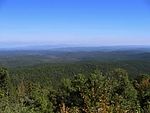 Ouachita Ouachita
Including the namesake Ouachita Mountains,
this forest has nearly 800,000 acres
(320,000 ha) of old-growth forest. The
forest has two wilderness areas: Black Fork
Mountain and Upper Kiamichi River. This
national forest is also partially located in
the state of Oklahoma. |
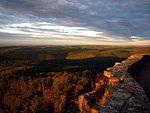 Ozark-St.
Francis Ozark-St.
Francis
Ozark-St. Francis National Forest has more
than 400 mi (640 km) of trails, including
the Ozark Highlands Trail. Blanchard Springs
Caverns is a three level cave system that is
open for public tours. |
|
|
|
National Parks |
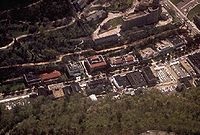 Hot
Springs Hot
Springs
Hot Springs was established as a federal
reserve by Congress on April 20, 1832—the
oldest area managed by the National Park
Service. Congress redesignated Hot Springs
as a national park on March 4, 1921. Natural
hot springs flow out of the Ouachita
Mountains, providing opportunities for
relaxation in a historic setting. Bathhouse
Row preserves numerous examples of
19th-century architecture.[66] Hot Springs
is the first national park in a city and was
the smallest national park until February
22, 2018 when the Jefferson National
Expansion Memorial was redesignated Gateway
Arch National Park. |
|
|
|
 Travel
America Travel
America
Do you love America and American English? Learn before
you travel. Facts and other cool stuff about your
favorite U.S. state. Visit the Fun Easy English Travel
America pages. Read about the beautiful National
Forests, Parks, and Monuments. Great English reading practice. |
 Drive America Drive America
Planning to drive in America? Learn the rules and
regulations. Great English reading practice. |
|